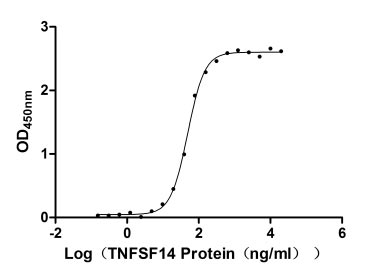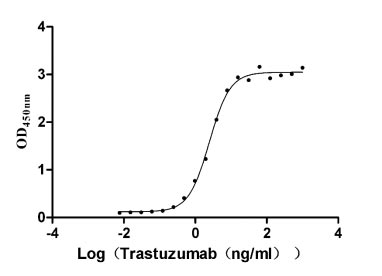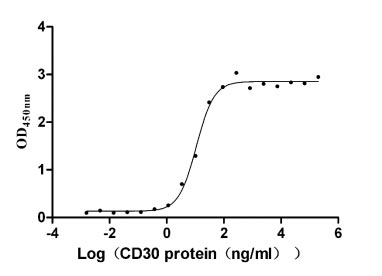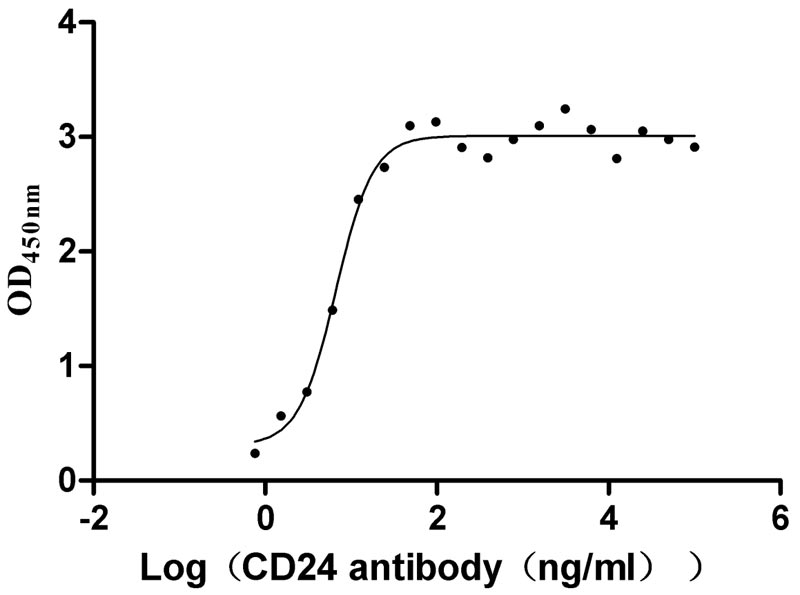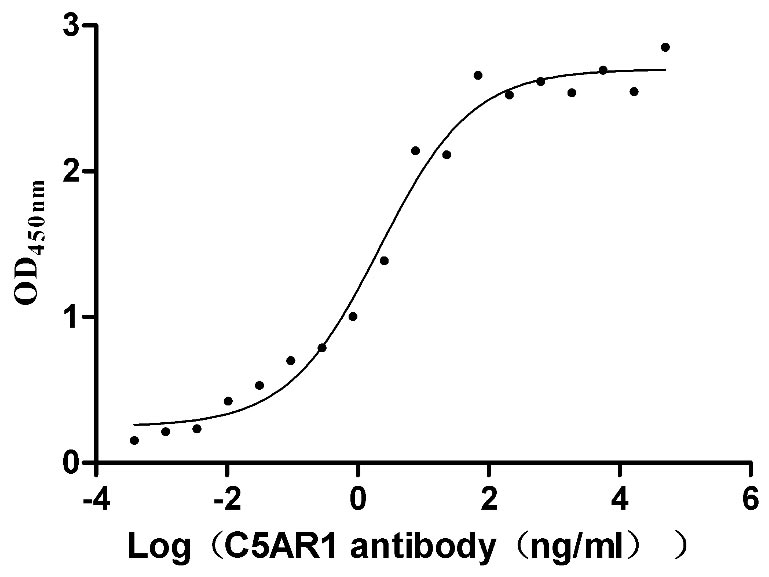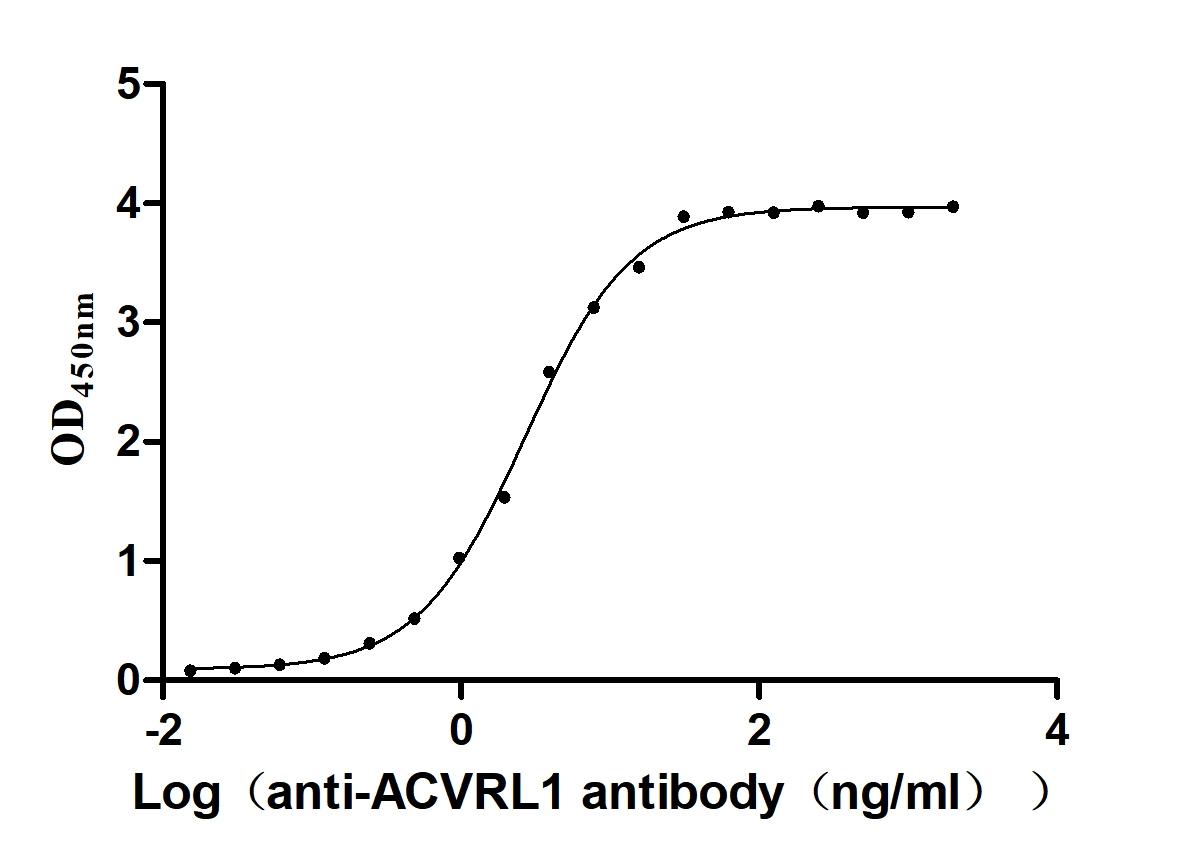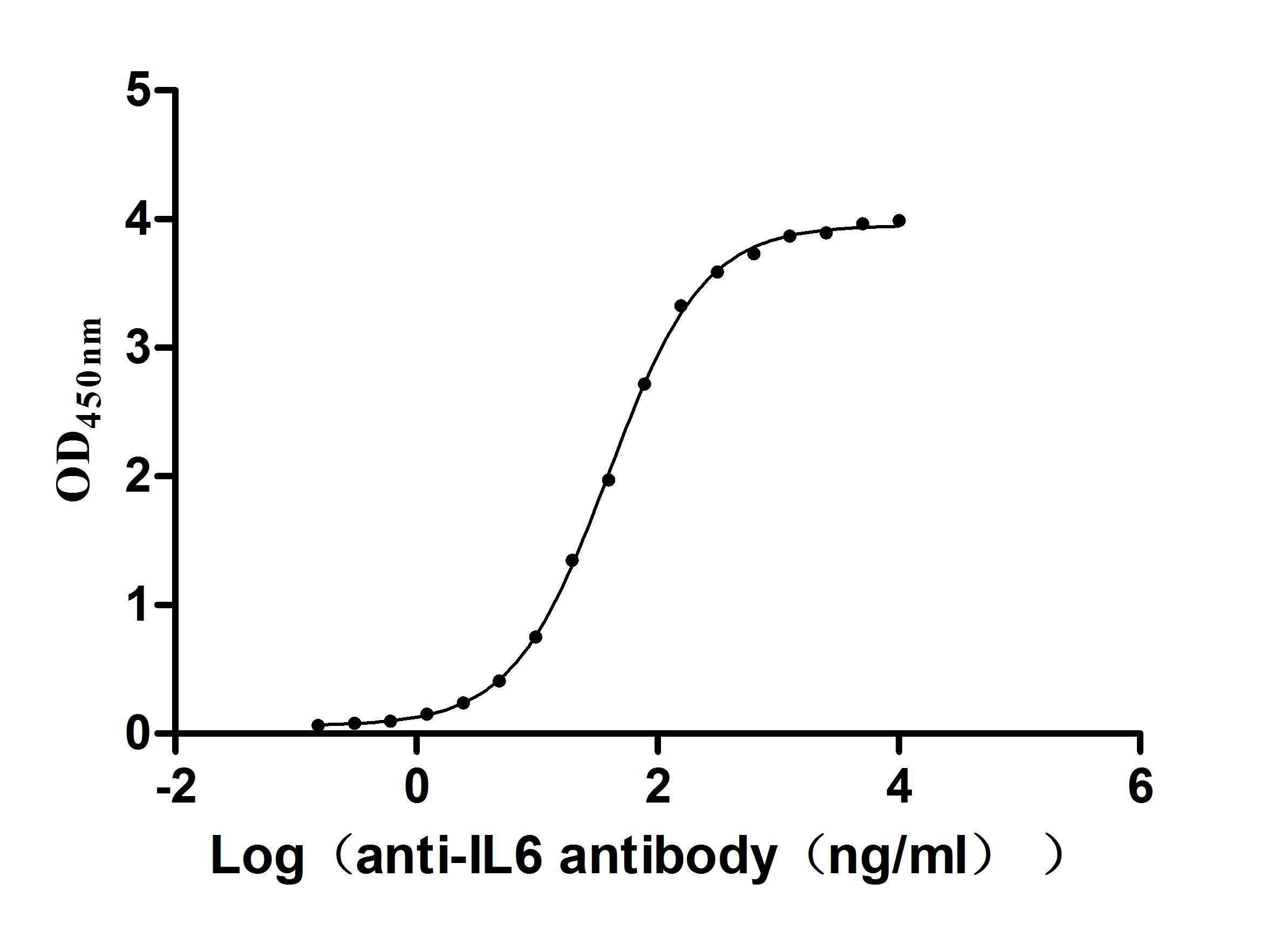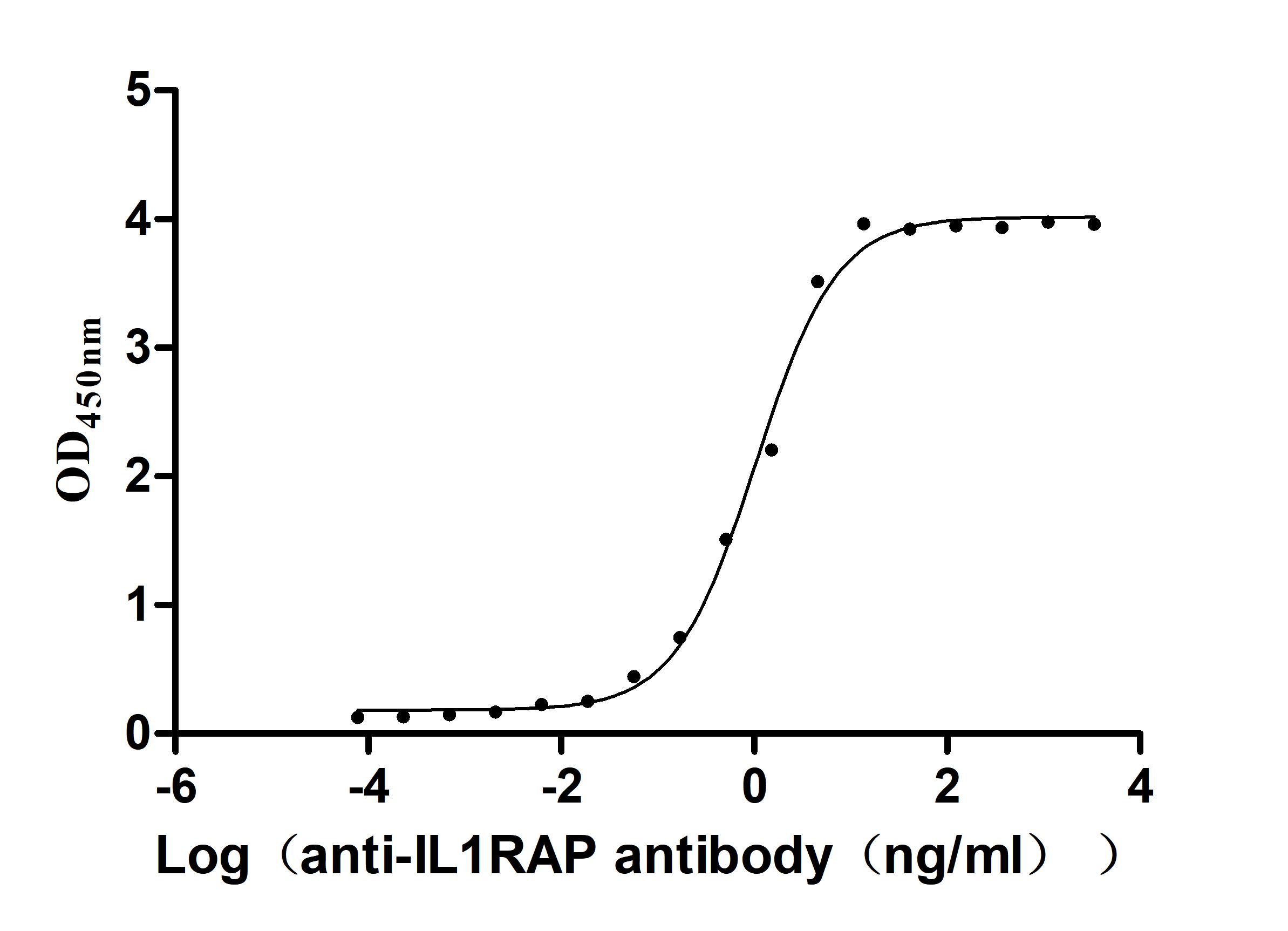Recombinant Mouse ADP-ribosyl cyclase 1 (Cd38), partial
-
货号:CSB-YP004929MO1
-
规格:
-
来源:Yeast
-
其他:
-
货号:CSB-EP004929MO1
-
规格:
-
来源:E.coli
-
其他:
-
货号:CSB-EP004929MO1-B
-
规格:
-
来源:E.coli
-
共轭:Avi-tag Biotinylated
E. coli biotin ligase (BirA) is highly specific in covalently attaching biotin to the 15 amino acid AviTag peptide. This recombinant protein was biotinylated in vivo by AviTag-BirA technology, which method is BriA catalyzes amide linkage between the biotin and the specific lysine of the AviTag.
-
其他:
-
货号:CSB-BP004929MO1
-
规格:
-
来源:Baculovirus
-
其他:
-
货号:CSB-MP004929MO1
-
规格:
-
来源:Mammalian cell
-
其他:
产品详情
-
纯度:>85% (SDS-PAGE)
-
基因名:
-
Uniprot No.:
-
别名:Cd38; ADP-ribosyl cyclase/cyclic ADP-ribose hydrolase 1; 2'-phospho-ADP-ribosyl cyclase; 2'-phospho-ADP-ribosyl cyclase/2'-phospho-cyclic-ADP-ribose transferase; 2'-phospho-cyclic-ADP-ribose transferase; ADP-ribosyl cyclase 1; ADPRC 1; Cyclic ADP-ribose hydrolase 1; cADPr hydrolase 1; I-19; NIM-R5 antigen; CD antigen CD38
-
种属:Mus musculus (Mouse)
-
蛋白长度:Partial
-
蛋白标签:Tag type will be determined during the manufacturing process.
The tag type will be determined during production process. If you have specified tag type, please tell us and we will develop the specified tag preferentially. -
产品提供形式:Lyophilized powder
Note: We will preferentially ship the format that we have in stock, however, if you have any special requirement for the format, please remark your requirement when placing the order, we will prepare according to your demand. -
复溶:We recommend that this vial be briefly centrifuged prior to opening to bring the contents to the bottom. Please reconstitute protein in deionized sterile water to a concentration of 0.1-1.0 mg/mL.We recommend to add 5-50% of glycerol (final concentration) and aliquot for long-term storage at -20℃/-80℃. Our default final concentration of glycerol is 50%. Customers could use it as reference.
-
储存条件:Store at -20°C/-80°C upon receipt, aliquoting is necessary for mutiple use. Avoid repeated freeze-thaw cycles.
-
保质期:The shelf life is related to many factors, storage state, buffer ingredients, storage temperature and the stability of the protein itself.
Generally, the shelf life of liquid form is 6 months at -20°C/-80°C. The shelf life of lyophilized form is 12 months at -20°C/-80°C. -
货期:Delivery time may differ from different purchasing way or location, please kindly consult your local distributors for specific delivery time.Note: All of our proteins are default shipped with normal blue ice packs, if you request to ship with dry ice, please communicate with us in advance and extra fees will be charged.
-
注意事项:Repeated freezing and thawing is not recommended. Store working aliquots at 4°C for up to one week.
-
Datasheet :Please contact us to get it.
相关产品
靶点详情
-
功能:Synthesizes the second messengers cyclic ADP-ribose and nicotinate-adenine dinucleotide phosphate, the former a second messenger for glucose-induced insulin secretion. Also has cADPr hydrolase activity.
-
基因功能参考文献:
- Pathological and morphological screening of CD38-/- mouse brains reveals the involvement of CD38 in the development of the primary visual cortex and the hippocampus. Results show that the neuron count in the primary visual cortex and the dentate gyrus was significantly decreased, and pyramidal neurons in the visual cortex and hippocampus have an abnormal morphology. PMID: 29306053
- our data are consistent with the conclusion that CD38 plays a role in murine and human lung tumorigenesis PMID: 29228209
- CD38 deficiency significantly protected hearts from lipid-induced injury via regulating redox homeostasis, lipid metabolism and apoptosis in myocardial cells through activating Sirt3/FOXO3 signaling pathway. PMID: 30114710
- these findings demonstrated a role of CD38 signaling pathway on the airway hyperresponsiveness of obesity PMID: 29414651
- data demonstrate that CD38 represents a new marker that identifies committed preadipocytes as CD45(-) CD31(-) CD34(low) CD38(+) cells PMID: 28611394
- Blockade of CD38 diminishes lipopolysaccharide-induced macrophage classical activation and acute kidney injury involving NF-kappaB signaling suppression. PMID: 29080804
- the results presented in this study suggest that CD38 deficiency induces features of autoimmune disorders in aged mice and that CD38 could play a role in the control of autoimmune diseases through their expression on regulatory B cells. PMID: 29603313
- CD38 plays an essential role in cardiac hypertrophy probably via inhibition of SIRT3 expression and activation of Ca(2+) -NFAT signaling pathway. PMID: 28296029
- Determined the role of CD38, an enzyme involved in cellular calcium modulation and autophagic flux, in the regulation of collagen I degradation in coronary arterial myocytes (CAMs).In primary cultured CAMs from CD38(-/-) mice, collagen I protein accumulation but not mRNA abundance was significantly increased compared with cells from CD38(+/+) mice. PMID: 27814632
- Data, including data from studies on cells from knockout mice, suggest that intracellular CD38 contributes to NAADP production and cADPR production in cardiomyocytes; membrane fractions from wildtype but not CD38-/- mouse hearts support NAADP and cADPR synthesis; CD38 may be associated with sarcoplasmic reticulum of cardiomyocytes. (NAADP = nicotinate adenine dinucleotide phosphate; cADPR = cyclic ADP-ribose) PMID: 28539361
- These data provide the first experimental evidence that the proper function of CD38/nicotinic acid adenine dinucleotide phosphate pathway plays an essential role in promoting free cholesterol efflux. PMID: 26818887
- expression and activity of the NADase CD38 increase with aging and that CD38 is required for the age-related NAD decline and mitochondrial dysfunction via a pathway mediated at least in part by regulation of SIRT3 activity. PMID: 27304511
- Study found that deletion of CD38 caused impaired astrocytic and oligodendrocytic development in the cortex, probably by increasing NAD+ levels and decreasing Cx43 expression levels. PMID: 28295574
- These results suggested that CD38 may be involved in the DC function of alleviating asthma via restoration of the Th1/Th2 balance, thus providing a novel strategy for asthma therapy. PMID: 27666020
- CD38 deficiency protects the heart from ischemia/reperfusion injury through activating SIRT1/FOXOs-mediated antioxidative stress pathway. PMID: 27547294
- Identification of multiple transferrin species in the spleen and serum from mice with collagen-induced arthritis which may reflect changes in transferrin glycosylation associated with disease activity: The role of CD38. PMID: 26639305
- CD38 is critical for regulating hippocampus-dependent learning and memory without modulating synaptic plasticity. PMID: 26856703
- CD38 signaling pathway is required for neuronal differentiation of embryonic stem cells by modulating reactive oxygen species production. PMID: 26012865
- CD38/cADPR-mediated Ca(2+) signals play a key role in glucagon-induced gluconeogenesis in hepatocytes, and that the signal pathway has significant clinical implications in metabolic diseases, including type 2 diabetes. PMID: 26038839
- CD38 is expressed in MDSCs in mouse models of esophageal carcinogenesis. CD38(high) MDSCs are immature, suggesting a potential role for CD38 in the maturation halt found in MDSC populations. IL6, IGFBP3, and CXCL16 induce CD38 expression by MDSCs ex vivo. PMID: 26294209
- CD38 activation after NADPH depletion triggers endothelial dysfunction in the postischemic heart PMID: 26297248
- In a model of Alzheimer disease, CD38 deficient mice had decreased amyloid-beta plaque burden, decreased microglia/macrophage accumulation, and better spatial learning. PMID: 25893674
- sCD38 released from seminal vesicles to the seminal plasma acts as an immunoregulatory factor to protect semiallogeneic fetuses from maternal immune responses PMID: 25591581
- These data demonstrate that B-cell precursors in mouse bone marrow express functional CD38 and implicate the early ligation of CD38 in the ERK-associated regulation of the B-lineage differentiation pathway. PMID: 25155483
- Data show that CD38 knockout mice presented significant increases of cytokine mRNA expression, as well as liver damage after lipopolysaccharide (LPS)/D-galactosamine (D-GalN)-induced acute hepatic injury. PMID: 25270198
- CD38 mediates microglial function and survival by mediating ATP release from microglia. PMID: 24578339
- CD38 plays a critical role in autophagosome trafficking and fusion with lysosomes PMID: 24445604
- CD38 in the nucleus accumbens and oxytocin are critical in paternal behavior. PMID: 24059452
- Renal vasoconstriction by vasopressin V1a receptors is modulated by nitric oxide, prostanoids, and superoxide but not the ADP ribosyl cyclase CD38. PMID: 24623148
- CD38 importantly control lysosomal function and influence autophagy at the maturation step in podocytes. PMID: 24238063
- results suggest that SNPs in CD38 may be possible risk factors for autism spectrum disorders (ASD) by abrogating oxytocin (OXT) function and that some ASD subjects can be treated with OXT in preliminary clinical trials PMID: 22366648
- The CD38/cADPR signaling pathway may be one underlying mechanism of the glucose and insulin effects of the alpha-2 adrenergic receptor agonist medetomidine and likely other drugs of its class. PMID: 23565906
- NOX1-dependent superoxide production mediates CD38 internalization in coronary arterial myocytes. PMID: 23940720
- In conclusion, these results demonstrate an essential role for CD38 in the innate immune response against Listeria monocytogenes. PMID: 23980105
- CD38-cADPR mediates bile acid-induced pancreatitis and acinar cell injury through aberrant intracellular Ca(2+) signaling. PMID: 23940051
- PECAM1(+)/Sca1(+)/CD38(+) vascular cells could proliferate and differentiate into myofibroblast-like cells in wound repair. PMID: 23308177
- These results show that CD38 is a novel pharmacological target to treat metabolic diseases via NAD(+)-dependent pathways. PMID: 23172919
- The tetrameric interaction underlies the multifaceted actions of CD38. PMID: 22863568
- the CD38-cADPR-Ca(2+) signaling pathway antagonizes the CM differentiation of mouse ES cells. PMID: 22908234
- The normal expression of CD38 importantly contributes to the differentiation and function of podocytes. PMID: 21992601
- Our results thus suggest that CD38 participates in the tumor-supporting action of glioma-infiltrating microglia and macrophages PMID: 22700727
- CD38 participates in the pathogenesis of collagen-induced arthritis controlling the number of iNKT cells and promoting Th1 inflammatory responses. PMID: 22438945
- a crucial role of CD38 in FcgammaR-mediated phagocytosis through its recruitment to the phagosome and mobilization of cADPR-induced intracellular Ca(2+) and store-operated extracellular Ca(2+) influx. PMID: 22396532
- we review the functional roles of cyclic ADP-ribose and CD38, a transmembrane protein with ADP-ribosyl cyclase activity, in mouse social behavior via the regulation of oxytocin (OXT) release--REVIEW PMID: 22227279
- direct evidence that the CD38 cyclic ADP ribose pathway is an important controller of Nox4-mediated intracellular superoxide production PMID: 22100343
- CD38 plays a critical role in the basal survival of microglia, and decreased CD38 can lead to caspase 3-dependent apoptosis of the cells. PMID: 22293203
- CD38 contributes to behavioral and metabolic circadian rhythms and altered NAD(+) levels influence the circadian clock. PMID: 21937766
- In conclusion, CD38 is important for neutrophils migration during hepatic amoebiasis, and in turn, these cells play an important role in the innate immune response. PMID: 21919917
- In vivo CD38 appears to be a NAADP degrading rather than a NAADP forming enzyme PMID: 22020217
- The myocardial contractility, contraction and relaxation velocities were significantly enhanced only in male CD38-null mice, in which the levels of serum testosterone were markedly elevated. PMID: 21840325
显示更多
收起更多
-
亚细胞定位:Membrane; Single-pass type II membrane protein.
-
蛋白家族:ADP-ribosyl cyclase family
-
数据库链接:
KEGG: mmu:12494
STRING: 10090.ENSMUSP00000030964
UniGene: Mm.249873
Most popular with customers
-
Recombinant Human Tumor necrosis factor ligand superfamily member 14 (TNFSF14), partial (Active)
Express system: Mammalian cell
Species: Homo sapiens (Human)
-
Recombinant Human Receptor tyrosine-protein kinase erbB-2 (ERBB2), partial (Active)
Express system: Mammalian cell
Species: Homo sapiens (Human)
-
Recombinant Human Tumor necrosis factor ligand superfamily member 8 (TNFSF8), partial (Active)
Express system: Mammalian cell
Species: Homo sapiens (Human)
-
Recombinant Human Signal transducer CD24 (CD24)-Nanoparticle (Active)
Express system: Mammalian cell
Species: Homo sapiens (Human)
-
Recombinant Human C5a anaphylatoxin chemotactic receptor 1 (C5AR1)-VLPs (Active)
Express system: Mammalian cell
Species: Homo sapiens (Human)
-
Recombinant Human Serine/threonine-protein kinase receptor R3 (ACVRL1), partial (Active)
Express system: Baculovirus
Species: Homo sapiens (Human)
-
-
Recombinant Macaca fascicularis Interleukin 1 receptor accessory protein(IL1RAP), partial (Active)
Express system: Mammalian cell
Species: Macaca fascicularis (Crab-eating macaque) (Cynomolgus monkey)


